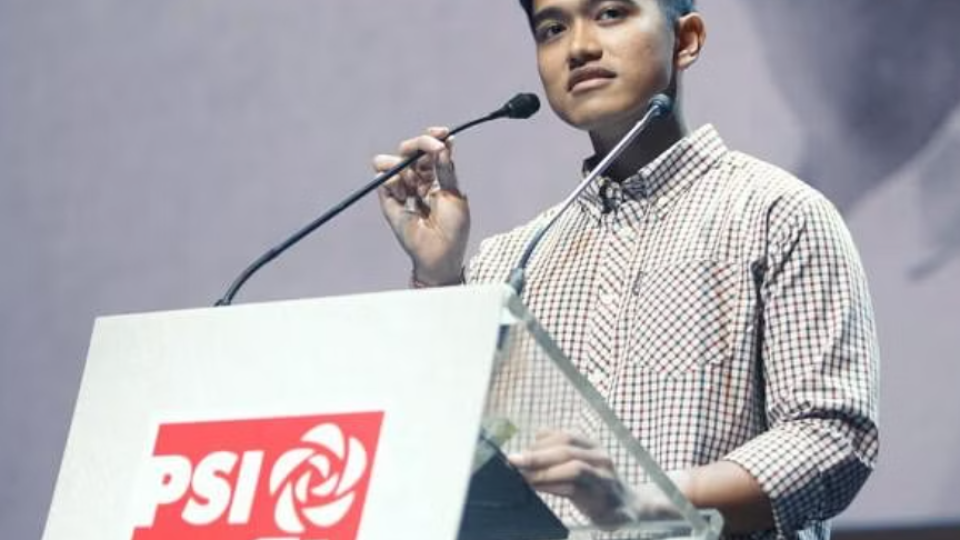JAKARTA (ANN/THE STRAITS TIMES) – The younger son of Indonesian President Joko ‘Jokowi’ Widodo, Kaesang Pangarep, 28, was appointed the new Indonesian Solidarity Party (PSI) Chairman on Monday during its national meeting.
The 28-year-old made headlines after expressing his desire to run for mayor in June, and has been swiftly rising within the ranks of the PSI within days of becoming a party member.
Analysts say the move was to boost Jokowi’s influence ahead of the presidential and legislative elections in February 2024, and regional polls in November 2024.
The PSI, established in 2014 by former television journalist Grace Natalie, who is ethnic Chinese and a Christian, is a small party with no representation in Parliament. Its members are young and social media-savvy, and position themselves as champions of Indonesian pluralism and the rights of minorities and the marginalised.
Mr Kaesang is the latest member of Jokowi’s family to enter politics, after his elder brother and Solo Mayor Gibran Rakabuming Raka, and his brother-in-law and Medan Mayor Bobby Nasution. The latter two, however, are members of the Indonesian Democratic Party of Struggle (PDI-P), like the President.
Mr Kaesang, a political greenhorn, is better known as an entrepreneur and social media celebrity who puts up humorous posts.
On these counts, his appointment seems like a tiny ripple in the ocean of complex Indonesian politics. But delve deeper and the battle for political influence brews, say analysts.
Jokowi took centre stage in his son’s first address as party chief to PSI members on Monday.
Mr Kaesang – wearing a chequered shirt similar to that worn by his father during his presidential campaigns – thanked his audience for their support for the President and said he hoped they would stay loyal.
He credited his father as his inspiration for joining politics and praised him for “tirelessly carrying out the mandate of the people” and “deciding the right policies for society”.
Mr Kaesang also appealed to Mr Widodo’s legion of supporters – known as Jokowers – who are not members of any political party to make PSI “a home which is friendly towards young nationalists”, whom he defined as those fed up with the practices of corruption and discrimination.
“Among them are also true Jokowers who believe that the development in the last five years must continue, and even be improved,” he added, indicating his commitment to continuing his father’s legacy.
Mr Wasisto Raharjo Jati, political analyst at the Indonesian National Research and Innovation Agency (Brin), said Mr Kaesang had chosen PSI over former Indonesian president Megawati Sukarnoputri’s PDI-P as it offered a new political vehicle for his family.
Mr Kaesang was aware that PDI-P, which also courted him, had not given “important, structural or strategic” positions to his father, brother and brother-in-law, who are its members, Mr Wasisto added.
“Kaesang is able to continue (to propagate) Jokowi’s thoughts and legacy at PSI rather than at PDI-P which is dominated by the Sukarno family and Sukarnoism,” he told the source, referring to Indonesia’s founding president and the umbrella of his ideas, including social and political ones.
“It is Kaesang’s mission to ensure Jokowi’s thoughts continue to exist once he steps down after the election in 2024,” he added.
Dr Ujang Komarudin, a political analyst from Indonesia’s Al-Azhar University, agreed, saying that PSI has presented Mr Widodo with an “alternative channel to continue his political life, given his current hot-and-cold relations with PDI-P”.
The local media has reported souring relations between Mr Widodo and Ms Megawati, purportedly over the choice of presidential and vice-presidential candidates, a claim that both have denied.
In turn, PSI gains the political backing of the powerful Indonesian leader to rake in votes and raise its chances of entering Parliament, which more than makes up for Mr Kaesang’s lack of political experience, Dr Ujang added.
“It’s a mutually beneficial tie-up. If Kaesang were not the President’s son, he would never become the PSI’s chair. That’s the political privilege he has,” the analyst told the source.
Getting his two sons to join different parties also demonstrates Mr Widodo’s political smarts in not putting all his eggs in one basket, Dr Ujang noted.
“PSI is still a small party now, but it could potentially become big in the future and Jokowi could move there,” he said.
But a win on the Widodo family’s political scorecard may be at the expense of Indonesian democracy, analysts say.
They note that Indonesian politics tends to focus on the position, power and popularity of political figures, instead of what they could bring to the table in terms of policies, programmes and ideas.
Professor Firman Noor, another political analyst from Brin, expressed his disappointment in PSI for “being just like any other party” which panders to the interest of those in power to survive in the crowded political space and win an election.
Mr Kaesang, he said, lacks the political experience to lead a party, with “being a president’s son his selling point”.
“At the end of the day, it seems like PSI is not selling ideas or working hard to get close to the people or educate them on politics, but is just looking for a shortcut,” Prof Firman told ST.
“Picking a popular figure does not help to mature the millennial generation or step up a good political education. It’s simply being opportunistic.”









